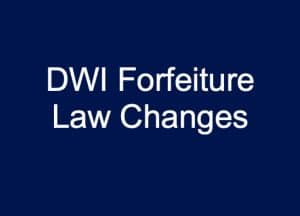The Minnesota Legislature is busy working to amend MN DWI vehicle forfeiture laws. Among the most prominent changes on the table will impact innocent owner claims and the ignition interlock exception. The bill passed the House State Government Finance Division and was referred to the Ways & Means Committee. It is gaining steam and there is tremendous optimism the bill will fully pass. In this post, we will focus on how the bill will alter the process for so-called innocent owners into asserting owners.
In this new bill, the legislature is adding the definition of an “asserting person” to mean “a person, other than the driver alleged to have committed a designated offense, claiming ownership interest in a vehicle that has been seized or restrained under this section.” If passed, asserting persons may bring innocent owner claims by notifying the prosecuting authority within 60 days of the notice of seizure. Then, the prosecutor will have the option to either (1) release the vehicle to the asserting person, or (2) file a separate complaint within 30 days.
If the prosecutor chooses to file a separate complaint, they must do so against the vehicle and serve it on the asserting person and any other registered owners. Service may be made by certified mail. Then, a hearing shall be held, to the extent practicable, within 30 days of the filing of the petition.
At the hearing, both sides will have burdens to prove. First, the prosecutor must prove by a preponderance of evidence that the vehicle seizure was incident to a lawful arrest or search. Second, the prosecutor must certify that they filed, or intend to file, charges for a designated offense against the driver or a designated license revocation occurred already. The asserting person will have to prove by a preponderance of evidence that the asserting person either (1) had actual ownership of the vehicle, or (2) did not have knowledge the vehicle would be used in a manner contrary to law or that they took reasonable steps to prevent use of the vehicle by the driver.
If either party fails to meet their burdens, the other side wins. If both parties meet their burdens, the asserting person wins. If the asserting person wins, the court will order the vehicle returned. But, the agency in possession of the vehicle may hold it until the asserting person pays reasonable costs of towing, seizure, and storage before the asserting person provided notice of their claim. The asserting person may also be held responsible for any reasonable costs of storage incurred more than two weeks after the judge’s order, if they won.
Robert H. Ambrose is a criminal defense attorney and DWI lawyer in Minnesota. Super Lawyers named him a Rising Star for the past five years; and the National Trial Lawyer’s Organization named him a Top 40 Under 40 Trial Lawyer the past seven years. He is an adjunct professor at both the University of Minnesota Law School and Hamline Mitchell School of Law. DWI Lawyer Woodbury MN; Criminal Defense Lawyer Minnesota; and DWI Vehicle Forfeiture Attorney.
[column parallax_bg=”disabled” parallax_bg_inertia=”-0.2″ extended=”” extended_padding=”1″ background_color=”” background_image=”” background_repeat=”” background_position=”” background_size=”auto” background_attachment=”” hide_bg_lowres=”” background_video=”” vertical_padding_top=”0″ vertical_padding_bottom=”0″ more_link=”” more_text=”” left_border=”transparent” class=”” id=”” title=”” title_type=”single” animation=”none” width=”1/1″ last=”true”]
[text_divider type=”double”]
REQUEST A FREE CONSULTATION
[/text_divider]
[column_1 width=”1/1″ last=”true” title=”” title_type=”single” animation=”none” implicit=”true”]
[contact-form-7 id=”9392″ title=”FREE REQUEST FORM”]
[/contact-form-7]
[/column_1]
[blank h=”30″]
[/blank]

